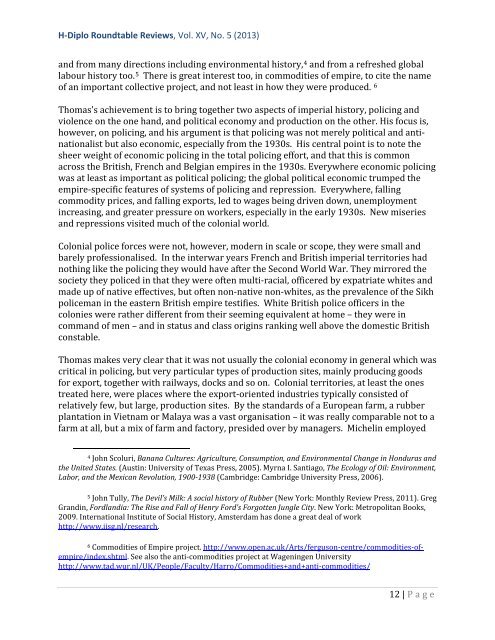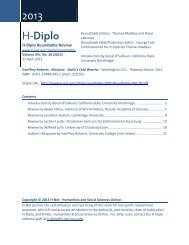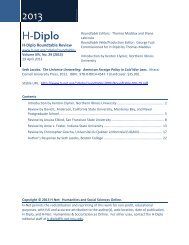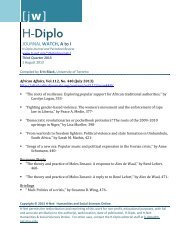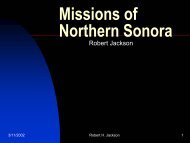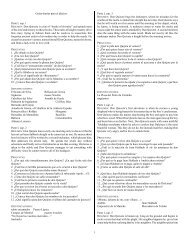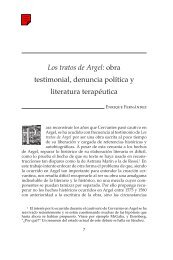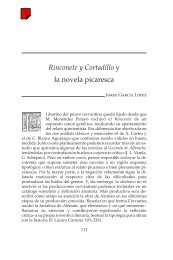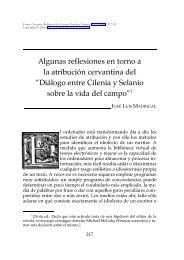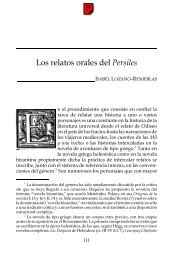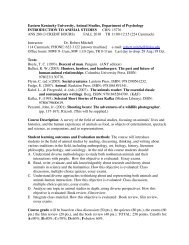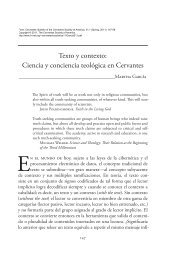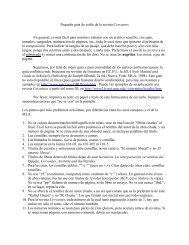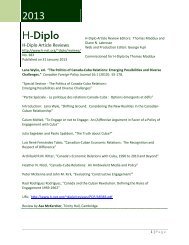H-Diplo Roundtable on Martin Thomas. Violence and ... - H-Net
H-Diplo Roundtable on Martin Thomas. Violence and ... - H-Net
H-Diplo Roundtable on Martin Thomas. Violence and ... - H-Net
You also want an ePaper? Increase the reach of your titles
YUMPU automatically turns print PDFs into web optimized ePapers that Google loves.
H-<str<strong>on</strong>g>Diplo</str<strong>on</strong>g> <str<strong>on</strong>g>Roundtable</str<strong>on</strong>g> Reviews, Vol. XV, No. 5 (2013)<br />
<strong>and</strong> from many directi<strong>on</strong>s including envir<strong>on</strong>mental history, 4 <strong>and</strong> from a refreshed global<br />
labour history too. 5 There is great interest too, in commodities of empire, to cite the name<br />
of an important collective project, <strong>and</strong> not least in how they were produced. 6<br />
<strong>Thomas</strong>’s achievement is to bring together two aspects of imperial history, policing <strong>and</strong><br />
violence <strong>on</strong> the <strong>on</strong>e h<strong>and</strong>, <strong>and</strong> political ec<strong>on</strong>omy <strong>and</strong> producti<strong>on</strong> <strong>on</strong> the other. His focus is,<br />
however, <strong>on</strong> policing, <strong>and</strong> his argument is that policing was not merely political <strong>and</strong> antinati<strong>on</strong>alist<br />
but also ec<strong>on</strong>omic, especially from the 1930s. His central point is to note the<br />
sheer weight of ec<strong>on</strong>omic policing in the total policing effort, <strong>and</strong> that this is comm<strong>on</strong><br />
across the British, French <strong>and</strong> Belgian empires in the 1930s. Everywhere ec<strong>on</strong>omic policing<br />
was at least as important as political policing; the global political ec<strong>on</strong>omic trumped the<br />
empire-specific features of systems of policing <strong>and</strong> repressi<strong>on</strong>. Everywhere, falling<br />
commodity prices, <strong>and</strong> falling exports, led to wages being driven down, unemployment<br />
increasing, <strong>and</strong> greater pressure <strong>on</strong> workers, especially in the early 1930s. New miseries<br />
<strong>and</strong> repressi<strong>on</strong>s visited much of the col<strong>on</strong>ial world.<br />
Col<strong>on</strong>ial police forces were not, however, modern in scale or scope, they were small <strong>and</strong><br />
barely professi<strong>on</strong>alised. In the interwar years French <strong>and</strong> British imperial territories had<br />
nothing like the policing they would have after the Sec<strong>on</strong>d World War. They mirrored the<br />
society they policed in that they were often multi-racial, officered by expatriate whites <strong>and</strong><br />
made up of native effectives, but often n<strong>on</strong>-native n<strong>on</strong>-whites, as the prevalence of the Sikh<br />
policeman in the eastern British empire testifies. White British police officers in the<br />
col<strong>on</strong>ies were rather different from their seeming equivalent at home – they were in<br />
comm<strong>and</strong> of men – <strong>and</strong> in status <strong>and</strong> class origins ranking well above the domestic British<br />
c<strong>on</strong>stable.<br />
<strong>Thomas</strong> makes very clear that it was not usually the col<strong>on</strong>ial ec<strong>on</strong>omy in general which was<br />
critical in policing, but very particular types of producti<strong>on</strong> sites, mainly producing goods<br />
for export, together with railways, docks <strong>and</strong> so <strong>on</strong>. Col<strong>on</strong>ial territories, at least the <strong>on</strong>es<br />
treated here, were places where the export-oriented industries typically c<strong>on</strong>sisted of<br />
relatively few, but large, producti<strong>on</strong> sites. By the st<strong>and</strong>ards of a European farm, a rubber<br />
plantati<strong>on</strong> in Vietnam or Malaya was a vast organisati<strong>on</strong> – it was really comparable not to a<br />
farm at all, but a mix of farm <strong>and</strong> factory, presided over by managers. Michelin employed<br />
4 John Scoluri, Banana Cultures: Agriculture, C<strong>on</strong>sumpti<strong>on</strong>, <strong>and</strong> Envir<strong>on</strong>mental Change in H<strong>on</strong>duras <strong>and</strong><br />
the United States. (Austin: University of Texas Press, 2005). Myrna I. Santiago, The Ecology of Oil: Envir<strong>on</strong>ment,<br />
Labor, <strong>and</strong> the Mexican Revoluti<strong>on</strong>, 1900-1938 (Cambridge: Cambridge University Press, 2006).<br />
5 John Tully, The Devil’s Milk: A social history of Rubber (New York: M<strong>on</strong>thly Review Press, 2011). Greg<br />
Gr<strong>and</strong>in, Fordl<strong>and</strong>ia: The Rise <strong>and</strong> Fall of Henry Ford’s Forgotten Jungle City. New York: Metropolitan Books,<br />
2009. Internati<strong>on</strong>al Institute of Social History, Amsterdam has d<strong>on</strong>e a great deal of work<br />
http://www.iisg.nl/research.<br />
6 Commodities of Empire project. http://www.open.ac.uk/Arts/fergus<strong>on</strong>-centre/commodities-ofempire/index.shtml.<br />
See also the anti-commodities project at Wageningen University<br />
http://www.tad.wur.nl/UK/People/Faculty/Harro/Commodities+<strong>and</strong>+anti-commodities/<br />
12 | P age


